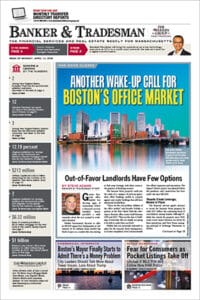Now that Sovereign Bank New England has completed the conversion of branches from FleetBoston Financial, Chairman and Chief Executive Officer John P. Hamill hopes to return to business as usual.
In the third phase of its branch acquisition from Fleet, the Philadelphia-based bank starting July 21 put its name on another 109 branches and 210 ATMs, mostly located in Central and Eastern Massachusetts. Fleet and BankBoston were required to sell more than 300 branches as a result of their merger. Sovereign’s New England franchise now includes a total of 281 branches, more than 550 ATMs, and approximately $12 billion in deposits and $8 billion in loans.
“We’re taking on a million and a half customers,” Hamill said in a phone interview with Banker & Tradesman last week. “We want to concentrate on them at this point in time.”
In addition to the Bay State branches, the third phase of conversion included 13 New Hampshire branches. Sovereign made a gradual entrance into New England, entering Western Massachusetts, Connecticut and Rhode Island in March and rolling out many of its Eastern Massachusetts branches in June.
The bank has been successful in retaining about 98 percent of the customers it gained in the first two conversions, according to Sovereign Bank President and Chief Executive Officer Jay S. Sidhu. The volume of business loans exceeded expectations after the branch acquisitions in March and June, he said. In addition, the volume of consumer loans increased approximately 9 percent from the levels when they were acquired.
“We’re offering our loans and deposit products and feeling very good about the reception we’re getting in those places that we’re already open,” Hamill said.
But establishing a foothold in the region may be expensive and the company is still trying to forge its identity in the area, said Kevin Timmons, senior banking analyst for First Albany.
“The environment right now is pretty competitive, and in order to make sure they retain the business that they bought and paid a premium for, I suspect they’re having to pay prices higher than they anticipated,” Timmons said.
On Cape Cod, where Sovereign’s package included only four branches, the bank elected to resell them to Rockland Trust Co. rather than compete with established institutions. Rockland will convert the branches next month.
Independent banks across New England have been targeting customers affected by the Fleet and BankBoston merger, and the resulting sell-off to Sovereign, through advertising campaigns and special promotions.
“If a bank is independent and has local identity, it has a couple of things going for it that Sovereign doesn’t,” Timmons said. “What Sovereign has going for it is customer inertia.”
After conversion-related work tapers off, Sovereign Bank New England will look into new products and marketing efforts. Sovereign Bank offers free checking to customers in its Philadelphia market, but does not offer the popular account at its New England branches.
“We’ve got some research going on to make sure we understand what the market wants and needs,” Hamill said. “In September we’ll be making some decisions about marketing and any new products and services we’ll offer.”
For some time before its merger with BankBoston, Fleet had been reducing the size of its branch network in the Berkshire area. Hamill said the bank has not made plans for the area, or plotted in which New England markets it will focus its growth.
“We like what we have there,” Hamill said. “Obviously if there’s an opportunity to increase our presence we’d consider it. At this point it’s a little premature.”
Potential Target
Sovereign will probably not consider further growth until sometime next year, said analyst Timmons.
“I’m sure in their eyes right now there’s only one task, and that’s to get past this final conversion,” he said. “I think they feel OK about where they are.”
Sovereign has $35 billion in assets and 575 branches. In addition to its New England franchise, the bank has offices in Pennsylvania, Delaware and New Jersey. Its status as a mid-sized bank may make Sovereign an attractive buy for a larger banking company that wants to expand in the Northeast.
“Certainly any bank in that mid-sized area is viewed both as a potential acquirer and as a target,” Timmons said. “Assuming they get past this whole thing and there are buyers actively looking to buy a banking business in the Northeast quadrant of the country, I think they would be attractive.”
Buying the $12 billion-asset package from Fleet was a significant undertaking for Sovereign, which had $25 billion in assets at the time it submitted the winning bid. To pay Fleet $1.4 billion for the package, Sovereign divided the purchase into three parts and employed debt financing.
In mid-July Sidhu said he has plans to pay off up to $4 billion in wholesale borrowing by the end of this month.
The bank released its second-quarter earnings report last week, posting a loss of $48.7 million in net income. During the quarter the bank took special charges tied to acquisitions and a restructuring of the balance sheet.
Sovereign’s operating earnings increased 17 percent in the second quarter to $57.3 million, up from $48.8 million in the second quarter of 1999.
“We are pleased that our core operating fundamentals remained solid through the second quarter while successfully converting the second phase of our New England acquisition,” Sidhu said.






